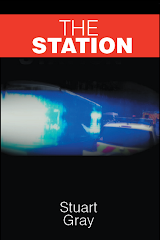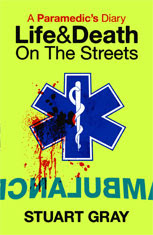Six calls – one conveyed, one false alarm and four taken by ambulance.
My near-faint calls are almost always simple affairs. Get there, watch them recover and either take them in for obs or let them get on with their day, depending on various factors. My first call today was to an 18 year-old male who had almost passed out on a train. It looked like the ‘usual’ type of call to me but when I got on scene he explained that he had a congenital heart defect; aortic valve regurgitation (a leaky heart valve).
He looked pale and was very weak, considering how young he was. His pallor and lethargy made his condition very relevant and so I took it seriously, although he showed no sign of imminent collapse. The crew arrived shortly after I started my obs and he was taken to the ambulance for an ECG, which turned out to be abnormal. To be honest, I wasn’t sure if the abnormalities were significant or usual for this type of heart defect but none of us were taking any chances with him, so he went to hospital for a more in-depth examination.
I conveyed my next patient in the car. She was a 50 year-old lady who had collapsed at work. When I got to her, she had been waiting almost an hour for an ambulance. She had a headache and felt weak but was otherwise okay, so I took her myself, rather than wait any longer for transport. At first she was reluctant to walk with me to the car but her need to go to the toilet overtook her fear of falling down and I used the trip across the hall to the loo as an excuse to divert her to the car (after she had been to the toilet, obviously). She recovered well on oxygen and was in good spirits when she arrived at the hospital. I had to borrow a chair from one of the crews because the hospital was full of people and every wheel chair was being used. When I returned the chair to the crew a very strange thing happened.
‘Thanks for letting me use your chair’, I said to my colleague (who I didn’t know at all).
‘No problem...and thank YOU for bringing that patient in’.
That was the first time an ambulance crew had ever acknowledged the small part I played in freeing up vehicles by conveying non-emergency patients. They were obviously very busy in this part of town and grateful for the help. It’s nice to get a pat on the back from a colleague. Rare but nice.
A call to the Polish Embassy in Central London where the queues outside seem to last all day, starting in the early hours. The call was for a 30 year-old male ‘? Fitting’. I arrived and battled my way through the crowd of Polish people at the doorway. Inside the security guy pointed to a tall, thin man who was standing at a table. He had cuts and bruises to his face; he looked like he had just been fighting someone. He didn't look post ictal, so I don’t think he had been fitting. I wasn't sure what he needed an ambulance for and the security man didn't offer any explanation for the state of his face. I smelled a rat.
The ambulance pulled up outside and I walked the man, who didn’t or couldn’t speak English, to the waiting crew. I left them to it and did my paperwork. Then off I went to my next call – a 30 year-old collapsed after jogging.
When I arrived I was directed to an alleyway by a canal. There was no way I could drive the car down it, so I got all my bags out and walked the 100m or so to a small group of joggers who were standing or crouching over a man on the ground.
The daylight was beginning to fade and the grass was damp, so my obs were carried out with wet knees and a pen torch.
The man had been jogging with his work colleagues when he suddenly collapsed and became unconscious. Now he was awake but he didn’t seem aware. At first I thought he may have had a seizure but he was able to shake his head in answer to my questions. He wasn’t epileptic and he had no medical problems. But he wouldn’t talk to me. He kept trying to go to sleep in the grass. His behaviour was quite unusual.
When the crew arrived we took him to the ambulance and continued our checks, including an ECG and that’s when we discovered a potential problem. He had pronounced ST elevation and, considering his recent activity ( I was told he wasn’t a regular jogger and that they had been running hard), there was a real possibility of an MI here.
He was ‘blued’ into the nearest cath lab but their investigations showed no coronary obstruction, even though their own ECG’s confirmed the changes we had seen. In fact they observed an increasing elevation during those tests. It was a mystery.
No doubt he was kept in until they got to the bottom of his problem. There are many things that can cause sudden collapse after strenuous exercise but finding a single cause can sometimes be a question of knowing the right things about a person’s medical history and waiting for the next event to occur.
I had a rest after that job and got called back to the Polish Embassy when I was suitably refreshed (coffee and cake). I knew I was going to the same man.
When I arrived, the crew were pulling up. I explained what had happened earlier in the day and they came with me to check the ‘patient’ out but he was gone. He had run off when he heard the sirens. Now I knew what was going on. He was obviously not wanted by the Embassy staff and they had called us to get rid of him. The police probably wouldn’t come, so they had used the ambulance service, more particularly our lights and sirens, to get him to clear off. It is a disgusting abuse of the service by an official Government institute in my opinion.
This time the man was lurking around the corner with his bruised and battered face (we never found out how that happened). He had gone to hospital with the last crew, walked straight out of A&E and come back to the Embassy. He was a nuisance to everyone, so we made a point of finding him and warning him off (after asking him if he needed an ambulance of course). He hadn’t called us but we made it clear to him that he was not to trigger calls from anyone else. I think he understood but I don’t think he cared. Luckily, I didn’t see him again after that but I wonder if others crews were called to him.
Finally, a call to a 35 year-old alcoholic who had been fitting in a hostel. When I asked him about his seizure he denied anything was wrong and tried to stand up. He was very unsteady on his feet and was diaphoretic, although he seemed to be recovering. The hostel staff had called us and they were concerned about him after witnessing him fitting for five minutes.
The crew arrived within ten minutes of me and he was quickly taken to hospital. Thus ended another day at the office. The nights are fair drawing in, as we say in the Homeland.
Be safe.
Subscribe to:
Post Comments (Atom)















11 comments:
Sometimes see ST elevation with an intracranial bleed. Wonder if your chap got scanned?
Hello mate, thanks for answering my comment. I'm glad they're getting through! It's a sad state of affairs that the Embassy had to call you out because they couldn't deal with this themselves, what a waste of your time ~ again! An awful lot of alcoholics seem to have fits. I've read your links about the "withdrawal" fits but could they possibly have fits because they're dehydrated? I know they drink a lot but obviously not the right sort of liquid ~ water for example. I like to look up your links ~ there wasn't one for "diaphoretic" ~ could you point me in the right direction please? Thanks mate, take care, love Debbie x
http://journals.aol.co.uk/debbiewebb4465/TheLifeTimesofanEssexGirl
Hi there.
I heard a paramedic friend of mine speaking to a colleague of his sometime back and they were discussing endotrachea and nasal trachea intubation. I understand the process of intubation by means of a laryngscope in order to secure an airway but what is the difference between nasal and endotracheal I mean I pressume nasal is through the nose but in what circumstances would you use noth these methods and nasal trachea would you also use a laryngoscope.
Hi. Could you please explain what the protocol is for calling out HEMS and in what event or circumstance would you call them out ? Also is it true that for a hanging in the event of a suicide, it is compulsory to notify HEMS ?
Why is it that two ambulances will be dispatched in a cardiac arrest incident ? Surely the second ambulance would be more useful to responding to another "Emergency" ?
Hello, You stated in one of your previous comment reply's to a reader that their are circumstances that yourself or a doctor would perform on site surgical procedures and operations ? I understand that this would probably be one of the last solutions to consider, as surely infection would be a high risk in such an enviroment ?
If you arrive on lets say a scene of a bad RTC and there is a deceased individual, would it be protocol to remove the corpse immedietly out of the veiw of the public ? One hardly, if ever sees such pictures of a crime scene or accident in the press ?
Have you ever had to attend a to someone who has been shot ?
I have read your blog for sometime now and while reading one of your posts I cam across a link to an interview you gave to Radio 4 (?) I would love to hear it but I am having difficulty in locating it on the site ? if you could help, I would really be grateful. Thanks
anonymous
You ask an awful lot of questions in quick succession. I don't have the time to reply to all of them, I'm afraid but the answers are all to be found within the blog, either in the postings or in the glossary.
debbie
Diaphoretic means profuse sweating. You can find this and other definitions and explanations if you click on the TPD glossary link in the left hand bar.
Post a Comment